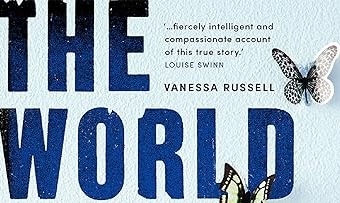Book Review: The World is not Big Enough
Vanessa Russell, Hardie Grant Books, 2021
With some nervousness, this refugee supporter took the plunge in 2001 and did what many others have boldly attempted: to contact a refugee stuck inside the Australian detention system and try to improve their life. The suggestion from the Melbourne-based Refugee Action Collective and Spare Rooms for Refugees (Kate Durham and Julian Burnside) was, for those who could, to put someone up in their house. The nominee in this case was Ahmed Shah Abed, an Afghan in the Port Hedland (WA) detention centre, but Vanessa Russell lived outside suburban Melbourne, so it never actually happened. However, mail and phone contact, and some support occurred for a few years until their slightly awkward relationship petered out, and some of his dozen letters are included to give the flavour.
Ten years later, out of idle curiosity, Russell googled him and learnt of his release on a TPV (Temporary Protection Visa) and his mysterious death a few years later. She needed to know what happened and understand him better, so revisited the letters and phone calls, visited Christmas Island and Port Hedland, and tracked down his friends in Perth. She also met and corresponded with a second refugee named Osman, also an on-off friend of the victim. Osman had been gaoled for life, with 17 years minimum, for the murder of Ahmed.
Over her six years of investigation and interviews, Russell learnt much more about her deceased friend and his murderer, about Afghanistan, recent Australian refugee history, and about how the Australian social infrastructure of support worked, both official and voluntary. She is honest about her feelings and her ignorance, but clearly is a good listener, and provides more general insights by reporting the experiences of local residents near the centres, and the health, security, advocacy, church and legal workers, who help or hinder refugees. Officials and employees/contractors have their own stresses, being forbidden by law to publicly comment, which means uncomfortable lives for many. For the refugees, extended detention and insecure temporary visas were the niggling contributor to personal dysfunction, but the cultural assaults on detainees from official protocols amplified the damage eg. children at Christmas functions called out by their number to receive presents (“too many Muhammeds”), and family groups separated into smaller “nuclear” families. When insecurity is formalised into a TPV, with no hope for many to progress to permanency or citizenship, the need for health and welfare services is still there. After four years in detention, Ahmed attempted suicide and was relocated to the Graylands Hospital mental health service.
On release from detention, the government stripped away much support and allowed more refugees to work with a Bridging Visa E, so some of the big money available in Perth for FIFO mining workers was a source of remittances to families back home in Afghanistan. However, it also facilitated unfamiliar activities for young men in Australia; Osman had a number of sexual crimes alleged when he worked in Brisbane and spent about four years in gaol and mental institutions; fifteen months later he killed Ahmed.
A very interesting part of the book is towards the end, with its report of the Supreme Court judgement (from the public record), which includes the forensic psychiatrists’ reports on Osman, and discussion of how much moral culpability can be assigned to a mentally ill perpetrator. The author’s later interview with the defence attorney about the case, continues this.
This is a book which starts with a tragic personal story but provides much “warts and all” reportage from many participants in the refugee “capture and storage” system, and how the criminal justice system, in one case, deals with these personal specifics in its conclusions and reasoning. To her credit, the author does not suggest a neat answer to how much of Osman’s motive was due to mental illness, personal traits, his resentment, and feelings of inferiority towards his friend Ahmed, or a consequence of the wider difficulties he had in Afghanistan or in Australian detention.
Kevin Bain is a retired economic analyst and university teacher. His Refugee Reading Guide is at Bayside Refugee Support. It has short summaries of about 100 books published over the last 20 years.
